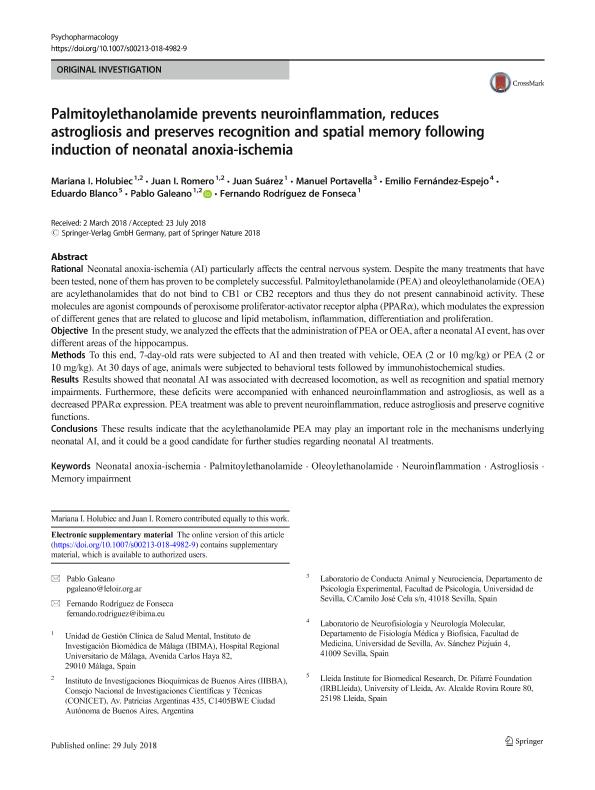Artículo
Palmitoylethanolamide prevents neuroinflammation, reduces astrogliosis and preserves recognition and spatial memory following induction of neonatal anoxia-ischemia
Holubiec, Mariana Ines ; Romero, Juan Ignacio
; Romero, Juan Ignacio ; Suárez, Juan; Portavella, Manuel; Fernández Espejo, Emilio; Blanco, Eduardo; Galeano, Pablo
; Suárez, Juan; Portavella, Manuel; Fernández Espejo, Emilio; Blanco, Eduardo; Galeano, Pablo ; Rodríguez de Fonseca, Fernando
; Rodríguez de Fonseca, Fernando
 ; Romero, Juan Ignacio
; Romero, Juan Ignacio ; Suárez, Juan; Portavella, Manuel; Fernández Espejo, Emilio; Blanco, Eduardo; Galeano, Pablo
; Suárez, Juan; Portavella, Manuel; Fernández Espejo, Emilio; Blanco, Eduardo; Galeano, Pablo ; Rodríguez de Fonseca, Fernando
; Rodríguez de Fonseca, Fernando
Fecha de publicación:
10/2018
Editorial:
Springer
Revista:
Psychopharmacology
ISSN:
0033-3158
e-ISSN:
1432-2072
Idioma:
Inglés
Tipo de recurso:
Artículo publicado
Clasificación temática:
Resumen
Rational: Neonatal anoxia-ischemia (AI) particularly affects the central nervous system. Despite the many treatments that have been tested, none of them has proven to be completely successful. Palmitoylethanolamide (PEA) and oleoylethanolamide (OEA) are acylethanolamides that do not bind to CB1 or CB2 receptors and thus they do not present cannabinoid activity. These molecules are agonist compounds of peroxisome proliferator-activator receptor alpha (PPARα), which modulates the expression of different genes that are related to glucose and lipid metabolism, inflammation, differentiation and proliferation. Objective: In the present study, we analyzed the effects that the administration of PEA or OEA, after a neonatal AI event, has over different areas of the hippocampus. Methods: To this end, 7-day-old rats were subjected to AI and then treated with vehicle, OEA (2 or 10 mg/kg) or PEA (2 or 10 mg/kg). At 30 days of age, animals were subjected to behavioral tests followed by immunohistochemical studies. Results: Results showed that neonatal AI was associated with decreased locomotion, as well as recognition and spatial memory impairments. Furthermore, these deficits were accompanied with enhanced neuroinflammation and astrogliosis, as well as a decreased PPARα expression. PEA treatment was able to prevent neuroinflammation, reduce astrogliosis and preserve cognitive functions. Conclusions: These results indicate that the acylethanolamide PEA may play an important role in the mechanisms underlying neonatal AI, and it could be a good candidate for further studies regarding neonatal AI treatments.
Archivos asociados
Licencia
Identificadores
Colecciones
Articulos(IIBBA)
Articulos de INST.DE INVEST.BIOQUIMICAS DE BS.AS(I)
Articulos de INST.DE INVEST.BIOQUIMICAS DE BS.AS(I)
Citación
Holubiec, Mariana Ines; Romero, Juan Ignacio; Suárez, Juan; Portavella, Manuel; Fernández Espejo, Emilio; et al.; Palmitoylethanolamide prevents neuroinflammation, reduces astrogliosis and preserves recognition and spatial memory following induction of neonatal anoxia-ischemia; Springer; Psychopharmacology; 235; 10; 10-2018; 2929-2945
Compartir
Altmétricas



